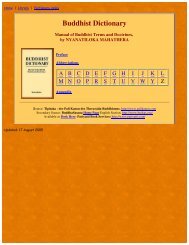Night and Morning with Bhikkhu Tissa
Night and Morning with Bhikkhu Tissa
Night and Morning with Bhikkhu Tissa
- No tags were found...
Create successful ePaper yourself
Turn your PDF publications into a flip-book with our unique Google optimized e-Paper software.
Gene: I guess I would be annoyed <strong>and</strong> uneasy.<strong>Bhikkhu</strong> <strong>Tissa</strong>: But why does that happen? Let’s consider. From the bare sensory data <strong>and</strong> your mentalhabits you quickly compile an image of an existing ego <strong>and</strong> allow yourself to give way to aversion as youthink about it.Gene: Maybe so, but isn’t that perfectly natural?<strong>Bhikkhu</strong> <strong>Tissa</strong>: Natural, but wrong. It’s a result of misperception.Gene: Because all things are actually non-self?<strong>Bhikkhu</strong> <strong>Tissa</strong>: Yes, but why are they non-self?Gene: Uh, let me see. Because they are impermanent?<strong>Bhikkhu</strong> <strong>Tissa</strong>: Yes, all formations are impermanent <strong>and</strong> compounded <strong>and</strong> unsatisfactory. And a personis, technically speaking, only the five aggregates or factors of material form, feeling, perception, mentalformations, <strong>and</strong> consciousness. So then, when you see a person you don’t like walk into a room, what do youreally see? What happens? Light strikes your eye, <strong>and</strong> visual consciousness arises; awareness of shape <strong>and</strong>color occurs. Likewise sound vibrations strike your ears <strong>and</strong> sound consciousness arises. From these <strong>and</strong> othersensory events you build up a view of that person. But if that “person” actually consists only of fiveimpersonal, changing aggregates, then who is it exactly that you would dislike?Gene: I can’t say, really.<strong>Bhikkhu</strong> <strong>Tissa</strong>: Would it be the material form, the body of this person that you would dislike? Or hisfeelings? Or his perceptions or mental formations or consciousness?Gene: No, it wouldn’t be any of them, exactly. It’s hard to say. If I disliked that person it could only besome general, overall idea that I disliked. It’s kind of absurd to hate mere impersonal aggregates, I know. Andhating them all together as some kind of ego doesn’t make much sense, either. This is confusing!<strong>Bhikkhu</strong> <strong>Tissa</strong>: Whether we’re considering other people or ideas or material objects, we’re liable to beconfused when we build up piles of unjustified concepts. We need a fresh, uncluttered view. That’s why theBuddha advises us to notice our sense experiences simply as what they are—just as occurrences of sight,sound, smell, <strong>and</strong> so on. If we do that we will have a better view of reality <strong>and</strong> become less oppressed bygreed, hatred, <strong>and</strong> delusion.Gene: And the complete ending of greed, hatred, <strong>and</strong> delusion would be Nibbána, wouldn’t it? Perfectpeace. No more suffering.<strong>Bhikkhu</strong> <strong>Tissa</strong>: That is what the Buddha attained. And that is what is possible for a truly diligent personto attain.Gene: And I am wondering if I am a diligent person. You think I should be, I know. It seems that in lookingfor meaning or truth I have to apply myself to a serious path <strong>with</strong> real effort. Knowing even so little of theBuddha’s teaching has made a tremendous difference to me already. I get lazy often; I get careless. But I can’tforget the Dhamma. When that dragonfly appeared it made me think again, so that I had to come here. Now,from what I’ve learned <strong>and</strong> thought <strong>and</strong> from what you’ve said, I kind of feel I have a duty to try to makeprogress. I can’t pretend I can just float along <strong>with</strong>out a care through life. There is, I guess, this great challengethat the Buddha reveals.<strong>Bhikkhu</strong> <strong>Tissa</strong>: The Buddha explains the bondage of the passions <strong>and</strong> the freedom of enlightenment.When we become aware of both we can’t escape our responsibility, can we? Actually, we’ve had thisresponsibility all along, but now we are really faced <strong>with</strong> it. So we have to choose intelligently <strong>and</strong>conscientiously. And would you really wish there were no challenge? Would you now wish you wereunaware of the extent of dukkha <strong>and</strong> unaware of the possibility of enlightenment?Gene: No. I’m happy I underst<strong>and</strong> even this tiny bit. It’s very strange—even <strong>with</strong> all my doubts I’m gladI’ve learned about the Dhamma, <strong>and</strong> I want to go deeper into it.<strong>Bhikkhu</strong> <strong>Tissa</strong>: The Buddha said that four wonderful things happen when a Fully Enlightened Oneappears in the world. Even though people delight in their attachments, when a Buddha teaches nonattachmentthey become interested <strong>and</strong> try to underst<strong>and</strong>. Even though people delight in pride, when aBuddha teaches getting rid of pride they become interested <strong>and</strong> try to underst<strong>and</strong>. Also, though people delight11
















